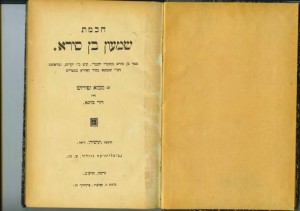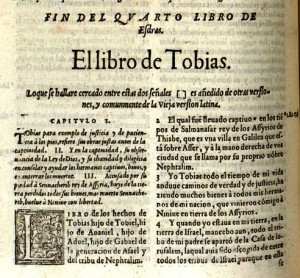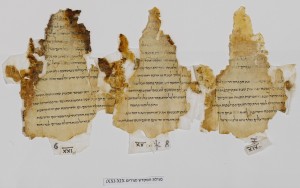Jewish Law
Let us begin with my favorite area, Jewish law. In studying the general legal system followed by the sect it is clear that sectarian law was characterized by a clear distinction between what was termed the “revealed law,” that is, the written Torah, and the “hidden law,” derived by sectarian exegesis and known only by the sectarians. This concept is clearly different from the rabbinic concept of a dual Torah, including a written law and an oral law. Further, the sectarian view makes no attempt to trace its second Torah to divine revelation at Sinai, seeing it, rather, as something that emerged from the life of the sect and its leadership. At the same time, it is hard to avoid the fact that the sectarian system and the Pharisaic-rabbinic dual Torah approach both provide for a supplement to the fundamental written Torah, solving in slightly different ways the difficult problem of applying the written Torah to the life of the community.
Further, both groups share the notion that the second Torah was divinely inspired. It is true that the Temple Scroll seems to be based on a very different approach, assuming instead that… Continue reading
References to Apocryphal Works in Rabbinic Literature
 More should be said about explicit references to apocryphal works in rabbinic literature. In fact, rabbinic texts only mention two such works, one being Ben Sira, that the rabbis apparently knew and which is quoted. Another is a certain book called Sefer ben La`ana, the contents of which we have absolutely no idea. The rabbis explicitly prohibit the reading of such books. There is something of an exegetical controversy regarding the meaning of this prohibition. On the one hand, it might be a blanket prohibition forbidding the reading of these texts under any circumstances. The assumption would be that it is forbidden to write any books other than those of Scripture, and therefore to read them. The other interpretation holds that what was prohibited was the public reading of these books as part of the lectionary. In this case, it would be permitted to read such books privately. Such an approach would explain the use of Ben Sira by the rabbis.
More should be said about explicit references to apocryphal works in rabbinic literature. In fact, rabbinic texts only mention two such works, one being Ben Sira, that the rabbis apparently knew and which is quoted. Another is a certain book called Sefer ben La`ana, the contents of which we have absolutely no idea. The rabbis explicitly prohibit the reading of such books. There is something of an exegetical controversy regarding the meaning of this prohibition. On the one hand, it might be a blanket prohibition forbidding the reading of these texts under any circumstances. The assumption would be that it is forbidden to write any books other than those of Scripture, and therefore to read them. The other interpretation holds that what was prohibited was the public reading of these books as part of the lectionary. In this case, it would be permitted to read such books privately. Such an approach would explain the use of Ben Sira by the rabbis.
An interesting parallel that will serve as an example of this phenomenon is the fundamental agreement of the theme of Jubilees, namely that the patriarchs observed all of the laws… Continue reading
Second Temple Literature and Rabbinic Judaism: Introduction
 One of the central issues of the history of Judaism is the periodization of its early history. Behind this issue lurks a much more central question: to what extent may we trace continuity between the various bodies of Jewish literature and religious ideas that they embody? When we study the development of Judaism from the late books of the Hebrew Bible, through the texts of the second Temple period, into rabbinic literature, to what extent do we observe continuity and to what extent do we see change?
One of the central issues of the history of Judaism is the periodization of its early history. Behind this issue lurks a much more central question: to what extent may we trace continuity between the various bodies of Jewish literature and religious ideas that they embody? When we study the development of Judaism from the late books of the Hebrew Bible, through the texts of the second Temple period, into rabbinic literature, to what extent do we observe continuity and to what extent do we see change?
This question is made more complex by the variegated nature of second Temple Judaism, to the extent that some would prefer to use the designation “Judaisms.” So we deal not only with the vertical, axis of historical change, but also with the horizontal axis of competing approaches to Judaism at various times–a phenomenon best documented and understood for the Hasmonean period but no doubt also present at other times as well. Within this complex framework, we seek to ask how the Judaism of the various second Temple period sects, Apocrypha, pseudepigrapha, Josephus and Dead Sea Scrolls, relate to the Judaism of the Mishnah, Talmud and midrash–the rabbinic or Talmudic… Continue reading

